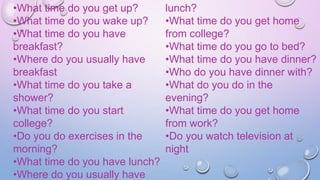
Present Simple.pptx
- 1. •What time do you get up? •What time do you wake up? •What time do you have breakfast? •Where do you usually have breakfast •What time do you take a shower? •What time do you start college? •Do you do exercises in the morning? •What time do you have lunch? •Where do you usually have lunch? •What time do you get home from college? •What time do you go to bed? •What time do you have dinner? •Who do you have dinner with? •What do you do in the evening? •What time do you get home from work? •Do you watch television at night
- 2. 1.Ask one of your classmates the following questions: What do you usually do in a normal day? 2.Then report your classmate’s routine to the class.
- 3. Simple Present Forms The simple present is just the base form of the verb. Questions are made with do and negative forms are made with do not. Statement: You speak English. Question: Do you speak English? Negative: You do not speak English. In the third person singular, -s or -es is added. Questions are made with does and negative forms are made with does not. Statement: He speaks English. Question: Does he speak English? Negative: He does not speak English.
- 4. Verb 3rd Person Speak Speaks Play Plays Give Gives Make Makes Normally in the present tense we add S to the end of the verb in the 3rd person (He, She, It). •He speaks three languages. •She drinks coffee every morning. •My dog hates my cat.
- 5. Verb 3rd Person Kiss Kisses Fix Fixes Watch Watches Crash Crashes Go Goes Irregular Verbs Irregular verbs in English in the present tense follow very simple rules. The only change that is made to these verbs is in the third person – for He, She or It. 1. If the verb ends in SS, X, CH, SH or the letter O, we add + ES in the third person. •A mechanic fixes cars. •She watches soap operas every afternoon. •He kisses his wife before he goes to work.
- 6. Verb 3rd Person Carry Carries Hurry Hurries Study Studies Deny Denies If the verb ends in a Consonant + Y, we remove the Y and + IES in the third person. •Isabel studies every night. •The baby cries all the time. •He denies all responsibility. play
- 7. Simple Present Uses USE 1 Repeated Actions Use the simple present to express the idea that an action is repeated or usual. The action can be a habit, a hobby, a daily event, a scheduled event or something that often happens. It can also be something a person often forgets or usually does not do. Examples: •I play tennis. •She does not play tennis. •Does he play tennis? •The train leaves every morning at 8 AM. •The train does not leave at 9 AM. •When does the train usually leave? •She always forgets her purse. •He never forgets his wallet. •Every twelve months, the Earth circles the Sun. •Does the Sun circle the Earth?
- 8. USE 2 Facts or Generalizations The simple present can also indicate the speaker believes that a fact was true before, is true now, and will be true in the future. It is not important if the speaker is correct about the fact. It is also used to make generalizations about people or things. Examples: •Cats like milk. •Birds do not like milk. •Do pigs like milk? •California is in America. •California is not in the United Kingdom. •Windows are made of glass. •Windows are not made of wood.
- 9. USE 3 Scheduled Events in the Near Future Speakers occasionally use simple present to talk about scheduled events in the near future. This is most commonly done when talking about public transportation, but it can be used with other scheduled events as well. Examples: •The train leaves tonight at 6 PM. •The bus does not arrive at 11 AM, it arrives at 11 PM. •When do we board the plane? •The party starts at 8 o'clock. •When does class begin tomorrow?
- 10. USE 4 Now (Non-Continuous Verbs) Speakers sometimes use the simple present to express the idea that an action is happening or is not happening now. This can only be done with non-continuous verbs and certain mixed verbs. Examples: •I am here now. •She is not here now. •He needs help right now. •He does not need help now. •He has his passport in his hand. •Do you have your passport with you?
- 11. Simple Present Tips ADVERB PLACEMENT The examples below show the placement for grammar adverbs such as: always, only, never, ever, still, just, etc. Examples: •You only speak English. •Do you only speak English?
- 12. Leaves the train at morning 10:30 in the.
- 13. Purse forgets always her she.
- 14. Here are the trees very tall.
- 15. To restaurant week every comes he the.
- 16. Class does tomorrow when begin?
- 17. To London often how does she travel?
- 18. Meat they eat do?
- 19. Every Sunday we go to a gallery.
- 20. Love you know that I.